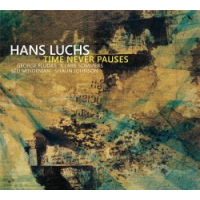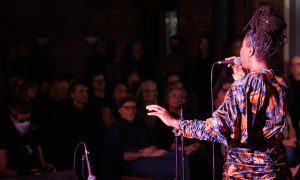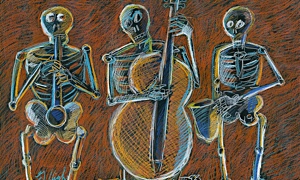Home » Jazz Articles » What is Jazz? » Jazz Music Is Ecstatic Language
Jazz Music Is Ecstatic Language
The word "ecstatic" comes from the Greek language and means "to step outside oneself." The word "ecstatic" is derived from the word "ecstasy" and can be defined as something outside the realm of normal experience—something incomprehensible or foreign to our ordinary understanding and experiences. An ecstatic experience is one of forgetting ourselves for the moment, of getting outside oneself in that moment. The ecstatic nature of music and the effect it has on the performers and listeners cannot be denied. It is universal, and something that all humans experience—not only in music but in many other arenas of life.There are those moments when performers and listeners are so into the music that time itself seems to be suspended, so totally absorbed are they by the musical experience that it can be emotionally overwhelming. Playing and/or listening to music can be totally energizing; it can be a spiritual experience. It appears that our brains and our very souls are hardwired to respond.
There are many musicians who, while playing jazz, have experienced what's been called,"breakthroughs" or "ecstatic" experiences. A careful study of the history of jazz reveals many moments where the music has become a very expressive and powerful vehicle which points to a spiritual dimension in life. Whether at funerals in New Orleans or in New York jazz clubs, music like pianist

Duke Ellington
piano1899 - 1974

John Coltrane
saxophone1926 - 1967

Dizzy Gillespie
trumpet1917 - 1993

King Oliver
trumpet1881 - 1938

Jelly Roll Morton
piano1890 - 1941

Louis Armstrong
trumpet and vocals1901 - 1971
The Reverend Alan Kershaw poignantly states, ..."jazz played with a feeling and inspiration seems to me more truly an act of worship than singing some of the religious songs I learned back in Sunday School. Life is so big and wide and deep that you just have to go beyond what's superficial, and banal, and what's phony. Faith rises above the streets, above the slime and the suffering men, to the source of goodness Himself. In this sense, jazz becomes a glorious anthem of praise." As jazz music is played and improvisation takes place, both the audience and the performers can become transported to a higher place. Entering another world of euphoric awareness and deep sensitivity, they can experience a profound sense of reverence for life and all living things; they become jazzed! In fact, it could be effectively argued that the word "jazz" and the word "ecstasy" mean virtually the very same thing.
Whatever you choose to call these experiences, they can be so energizing and joyful that you will never forget them. These ecstatic experiences are not, however, to be confused with the normal emotional responses that you have when playing or listening to music. During these special experiences time can seem to be temporarily suspended and the intensity is overwhelming. Trumpeter

Wynton Marsalis
trumpetb.1961
There are many examples in the history of jazz that document the ecstatic nature and its effects. New Orleans old-timer Jim Robinson once shared how it used to flow on the bandstand on certain nights: "If everyone is frisky, the spirit gets to me and I can make my trombone sing!" Singer

Ethel Waters
vocals1896 - 1977

Billy Higgins
drums1936 - 2001
Trombonist

Bob Brookmeyer
trombone1929 - 2011
Pianist/psychiatrist

Denny Zeitlin
pianob.1938
The great religious leader of the Reformation, Martin Luther, once expressed the following profound words: "we marvel when we hear music in which one voice sings [plays] a simple melody, while three, four or five other 'voices' play and trip lustily around the voice...and adorn this simple melody wonderfully with artistic musical effects, thus reminding us of a heavenly dance, where all meet in a spirit of friendliness, caress and embrace." Yes, perhaps, a heavenly dance that's intense and playful at the same time. It's a great high that's outside the norm of the mundane.
The fact is that countless millions have, over the course of history encountered deep spiritual experiences while either playing or listening to music. Indeed, the entire musical/creative process can be considered deeply spiritual. However, one important point to keep in mind is that music isn't very effective at all ushering in an "ecstatic moment" when listened to as primarily just playing in the background. It involves total concentration and participation. Unfortunately, it seems like that our present day culture hasn't the capacity for careful, intense listening to music by itself, without conversation or distraction. Jazz music is a wonderful gift, a mysterious improvisational spiritual language that beckons one beyond normal consciousness into the present moment; it is to be enjoyed and savored. So go ahead—get "jiggy" with it, because it "Tain't no sin to step out of your skin and dance around in your bones!"
Tags
David Arivett
What is Jazz?
United States
duke ellington
John Coltrane
Dizzy Gillespie
King Oliver
Jelly Roll Morton
Louis Armstrong
wynton marsalis
Ethel Waters
Billy Higgins
Bob Brookmeyer
Denny Zeitlin
Comments
PREVIOUS / NEXT
Support All About Jazz
 All About Jazz has been a pillar of jazz since 1995, championing it as an art form and, more importantly, supporting the musicians who make it. Our enduring commitment has made "AAJ" one of the most culturally important websites of its kind, read by hundreds of thousands of fans, musicians and industry figures every month.
All About Jazz has been a pillar of jazz since 1995, championing it as an art form and, more importantly, supporting the musicians who make it. Our enduring commitment has made "AAJ" one of the most culturally important websites of its kind, read by hundreds of thousands of fans, musicians and industry figures every month.






 Buy Now
Buy Now





















